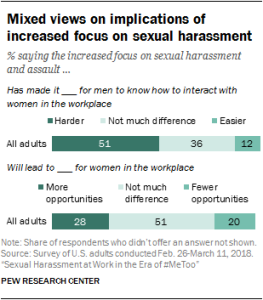The collective voices of the courageous women who chose to use their fame as a platform to invigorate the national dialogue on sexual harassment in the workplace has had profound impact. They brought national and global awareness to the victims of sexual harassment and visibility to the #MeToo Movement. Their actions have emboldened victims of sexual misconduct to speak up, incited enhancements to sexual harassment laws, and increased employers’ focus on removing perpetrators from positions of power.
Research shows that increased focus and more stringent enforcement of workplace protections have reduced levels of the most egregious forms of sexual harassment (unwanted sexual attention and sexual coercion). In a recent study from the University of Colorado, women report that they believe this reduction in sexual harassment is due to the increased scrutiny on the topic. In addition, they feel better supported and empowered and are not ashamed to speak up about sexual harassment.
Unexpected negative impact
While the removal of perpetrators from the workplace is positive, there is concern among human resources and diversity, equity and inclusion (DEI) practitioners about a mounting trend. Men in power positions who previously played key roles as mentors and sponsors for women’s career advancement and increasing diversity in leadership positions, are shying away. This is a common theme in recent research. For example:
among human resources and diversity, equity and inclusion (DEI) practitioners about a mounting trend. Men in power positions who previously played key roles as mentors and sponsors for women’s career advancement and increasing diversity in leadership positions, are shying away. This is a common theme in recent research. For example:
- LeanIn.org and SurveyMonkey’s recent poll found that 60% of male managers report feeling “too nervous” about being accused of harassment to interact with women in common workplace activities such as mentoring, socializing and one-on-one meetings.
- Bloomberg recently conducted interviews with more than 30 senior executives that suggest many are startled by the #MeToo movement – some for good cause while others succumb to fear and retreat from supporting leadership diversity. Male managers also have grown significantly more uncomfortable mentoring women than before.
- A Pew Research Center survey revealed that 51% of Americans believe the increased focus on sexual harassment has made it more difficult for men to know how to interact with women at work.
Men’s increasing reluctance to mentor women is a huge problem for DEI efforts to increase women in leadership.
What to do
In my professional role at Exude, Inc. we advise our clients to effectively manage the unexpected negative impact of #MeToo with the following tangible solutions:
Stay up-to-date – DEI change does not happen in a vacuum; your DEI objectives and initiatives are impacted by national and global events, the economy, changes in your industry and how your organization conducts business, the unexpected negative impact of positive social movements like #MeToo on women’s ascension to leadership roles, and loss of the key people driving DEI. DEI leaders should engage diversity committees, executive sponsors, and employee resource groups as watchmen to consistently identify potential derailments.
DEI contingency plan – Your organization is investing resources in DEI efforts because it’s a critical business imperative. Many organizations, however, don’t have a plan to protect the investment and realized gains. You need a “Plan B” if expected results fail to materialize and to effectively respond to unexpected derailments. The contingency plan will keep initiatives viable and keep you from losing ground on the gains you’ve realized.
Appoint more male leaders to diversity succession initiatives - Given that men still hold most positions of power in organizations their direct involvement is critical to the ascension of women. Reiterate to powerful men the business case for diversity. Remind them that without their support, women won’t receive the mentoring, visibility and sponsorship that opens doors of opportunity in the workplace; opportunities they themselves have benefited from. To alleviate men’s sensitivity to #MeToo, change the narrative and focus to diversity succession planning, and appoint powerful men as co-leaders with human resources to drive this effort. Give visibility to the effort, communicate successes to the organization, and give recognition, awards, or bonuses to those who stay committed.
Provide mentoring options – Continue to engage men in mentoring and offer them options. Allow mentors and mentees to select the format and location they prefer. For instance, one-on-one mentoring can be conducted virtually or in-person. Dedicate a location other than a private office for mentoring meetings to occur. Create “safe” mentoring social events where men and women may interact comfortably. Redesign and revive mentoring circles for women.
Dedicate a resource for retention and career progression for women – Create an internal talent scout role for a talent acquisition professional to focus on women’s ascension to leadership roles. Responsibilities should include coaching women, partnering with the training department to identify and support learning and development needs, recommending women for cross-functional projects and negotiating with hiring managers to get women into open roles.
The #MeToo Movement is critically important for women, organizations and society as a whole. As HR and DEI practitioners, we need to be mindful of the unintentional impact of national and global events, the economy, changes in our industries and organizations so that we can continue to drive and support progress.
